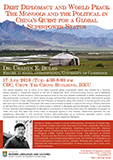Talk:
Debt Diplomacy and World Peace: The Mongols and the Political in China's Quest for a Global Superpower Status
Date: 17 Apr 2018 (Tue)
Time: 4:30 pm – 6:00pm
Venue: CBC, Chow Yei Ching Building, HKU
|
|
Uradyn E. Bulag is reader in social anthropology, University of Cambridge. His interests broadly span East Asia and Inner Asia, especially China and Mongolia, ethnicity and nationalism, diplomacy and statecraft, imperial heritage and its (un)sharing. He is the author of Nationalism and Hybridity in Mongolia (1998), Oxford: Clarendon Press, The Mongols at China’s Edge: History and the Politics of National Unity (2002), Lanham: Rowman and Littlefield, and Collaborative Nationalism: the Politics of Friendship on China’s Mongolian Frontier (2010), Lanham: Rowman and Littlefield, which received the International Convention of Asian Scholars 2011 book prize in social sciences.
Abstract
The recent ‘peaceful rise’ of China to its newly acquired global superpower status was marked by a massive military parade in Tiananmen Square on the 3rd of September 2015, commemorating China’s role in defeating Japan in 1945. On that occasion, China proclaimed itself as ‘the main Eastern battlefield’ in WWII, emphasising its disproportionate contribution to world peace through self-sacrifice. Amongst the high-profile international guests invited to China’s V-Day celebration was the President of Mongolia along with soldiers of the Mongolian army who also took part in the parade. This paper will make a two-pronged analysis to capture the irony of China’s discourse of self-sacrifice and its contribution to world peace in relation to Mongolia and the Mongols: Firstly, it will examine China’s reluctant acknowledgement of Mongolia’s contribution to liberating China from the Japanese occupation in 1945, and how this ‘debt’ that China owes to Mongolia figures in the ‘friendly’ relationship between the two neighbours. Secondly, it will scrutinise China’s self-construction as a historical ‘peaceful nation’, which necessitates an ancient foe, who is no other than its friendly neighbour Mongolia.
|

